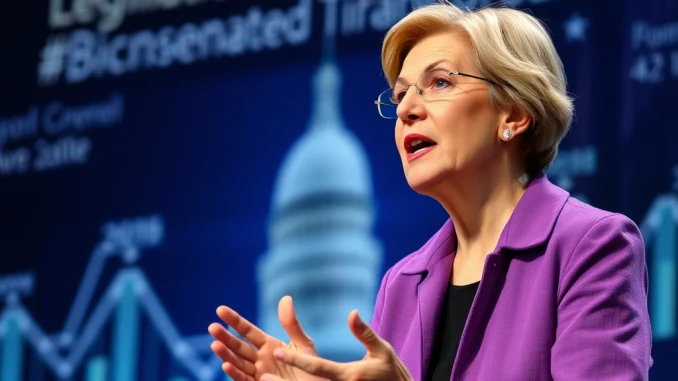
The world of cryptocurrency is constantly evolving, and so too is the regulatory landscape surrounding it. A recent development catching the attention of many involves a prominent US senator and a proposed piece of legislation. Senator Elizabeth Warren is once again making headlines in the crypto space, this time focusing on a specific provision within a bill known as the GENIUS Act.
Senator Warren Crypto Concerns Over GENIUS Act
Senator Warren has voiced strong criticism regarding a last-minute addition to the GENIUS Act. This particular provision, she argues, creates a significant ‘crypto loophole’ that could undermine efforts to prevent illicit finance within the digital asset ecosystem. Her concerns were publicly shared via social media, specifically targeting the Republican party for inserting this exemption.
According to Senator Warren, the timing and nature of this exemption are particularly troubling. She highlighted that this comes as reports circulate about the Trump family’s plans to launch their own crypto wallet. This connection, she suggests, raises questions about the motivation behind the exemption.
Understanding the Crypto Wallet Regulation Debate
At the heart of this issue is the debate around how crypto wallets should be regulated. Wallets are essential tools for holding and managing digital assets, but their varying forms (custodial vs. non-custodial) present different challenges for regulators trying to track transactions and ensure compliance with financial laws.
Senator Warren’s stance aligns with her broader calls for stricter US crypto regulation. She has consistently argued that the crypto market poses risks related to money laundering, sanctions evasion, and consumer protection, necessitating robust regulatory frameworks similar to traditional finance.
The Proposed Amendment to Address the Crypto Loophole
To counter the perceived weakness introduced by the exemption, Senator Warren has announced her intention to introduce an amendment to the GENIUS Act. The goal of this amendment is straightforward: to close the identified crypto loophole and ensure that crypto wallets are subject to appropriate anti-corruption and financial integrity measures.
She has been emphatic that the GENIUS Act, which otherwise deals with broader financial matters, should not pass Congress with this exemption intact. Her push for the amendment underscores her commitment to integrating digital assets into existing financial crime prevention structures.
What This Means for US Crypto Regulation
This move by Senator Warren is a clear signal that regulatory scrutiny on the crypto industry, particularly concerning infrastructure like wallets, is intensifying. While the outcome of the proposed amendment is uncertain, the debate itself highlights key tension points between policymakers and the crypto sector:
- Balancing Innovation and Regulation: How can regulators foster technological advancement while mitigating risks?
- Defining Crypto Entities: Should wallet providers be treated like financial institutions?
- Jurisdictional Challenges: How can US law effectively regulate a global, decentralized technology?
The outcome of this specific legislative skirmish could influence future regulatory approaches to digital asset infrastructure and user interaction points.
Conclusion: The Ongoing Battle for Crypto Clarity
Senator Warren’s planned amendment to the GENIUS Act is the latest development in the ongoing effort to define and enforce US crypto regulation. By targeting the crypto wallet loophole, she aims to ensure that digital assets do not become a haven for illicit activities. This situation underscores the critical need for clarity and robust frameworks as the crypto market continues to grow and integrate with the traditional financial system. The coming debate over this amendment will be a key event for anyone watching the future of crypto regulation in the United States.



